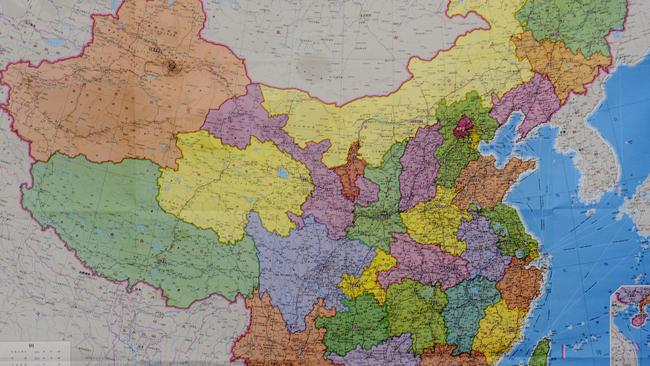Student denounces himself over ‘incorrect’ map of China
The editor of a Melbourne blog has been forced to publicly denounce himself after he published an “incorrect” map.

The editor of a Melbourne blog for Chinese students in Australia has been forced to publicly denounce himself after he published an “incorrect” map, illustrating the wave of nationalism among Chinese students.
Gao Song, the editor of the Melbourne student Wechat blog, was forced to denounce his actions after he used the online map — which did not include Taiwan as a Chinese territory — in an earlier blog post.
Expressing contrition, he said: “When we want people of other countries to respect one China, to respect the truth, we ourselves shouldn’t make mistake, and spread the wrong information.’’
He also urged other students to promote a “complete China” including Taiwan.
“I want to label myself as a patriotic overseas Chinese student … As overseas students we have an advantage, we can make people in other countries see a true, complete China.”
In four prominent cases, academic staff at Australian universities have been targeted in Chinese social media campaigns after complaints from Chinese international students about “offensive” teaching material. In many of these cases the lecturers or universities apologised, sparking a debate about academic freedom.
Swinburne University China scholar John Fitzgerald said the incidents at the universities, which include Sydney, Newcastle, Monash and the Australian National University, were signs of a major shift towards more brazen nationalism.
“For years, Chinese student organisations in Australia tied to the Chinese government have worked quietly behind the scenes to advance China’s interests and maintain ideological alignment of students with party values. But now Beijing is signalling that the gloves are off,” Dr Fitzgerald said.
Australian National University Chinese foreign policy professor Bates Gill said university administrators were aware of the issue and believed it could “get worse”. “But at this stage they are still flummoxed about what can be done,’’ he said.
In some cases, Chinese diplomats have contacted universities to discuss the issue.
Griffith University professor of international relations Ian Hall said there should be a rethink of whether government-monitored organisations should be allowed on campuses “regardless of the potential consequences for international fee income”.
Dr Gill and Monash University Chinese studies lecturer Jonathan Benney cautioned against a view most Chinese international students are fiercely nationalistic and said most were here to study and have a good time.
There has been fierce debate in the comment sections on Chinese social media articles about the incidents, with some suggesting the students should not have complained.
Some of these incidents have been closely covered and arguably encouraged by Chinese-Australian social media outlets - including Sydney Today and Australian Red Scarf.
Sydney Today, a Chinese-Australian media outlet who has driven coverage of the scandals, have hosted events attended by federal politicians on both sides, and were recently visited by the head of UTS’ Australian Chinese Relations Institute, Bob Carr.
Sydney Today, part of the privately owned Media Today group, have an office in China run by the company’s founder Stan Chen.
When the company advertised web producer roles at the China office in 2012, the ad said applicants must “love” China, not support any independent movements and be loyal to the party.
Australian Red Scarf – named after the scarves worn by the Communist Youth League’s Young Pioneers children’s organisation - is owned by Fancy Media’s Steve Yuan.
Chinese students made up about 30 per cent of the 554,179 full-fee paying international students in enrolled in Australian universities in 2016.
International Education Association of Australia warned this year that Australia was becoming more reliant on one country for international students, exposing the economy to risk if there were dramatic shifts in policy.
Revenue from international education is a major driver in Australia’s economy. Unprecedented growth in international student enrolments resulted in a $24 billion boost to the Australian economy in the 2016-17 financial year - an 18.5 per cent increase on the year before.
This presents universities with a dilemma.
“In my view they are trying to wrestle with how to maintain their academic standard and at the same time not put at risk what has become an extremely important source of revenue,” Dr Gill said.


